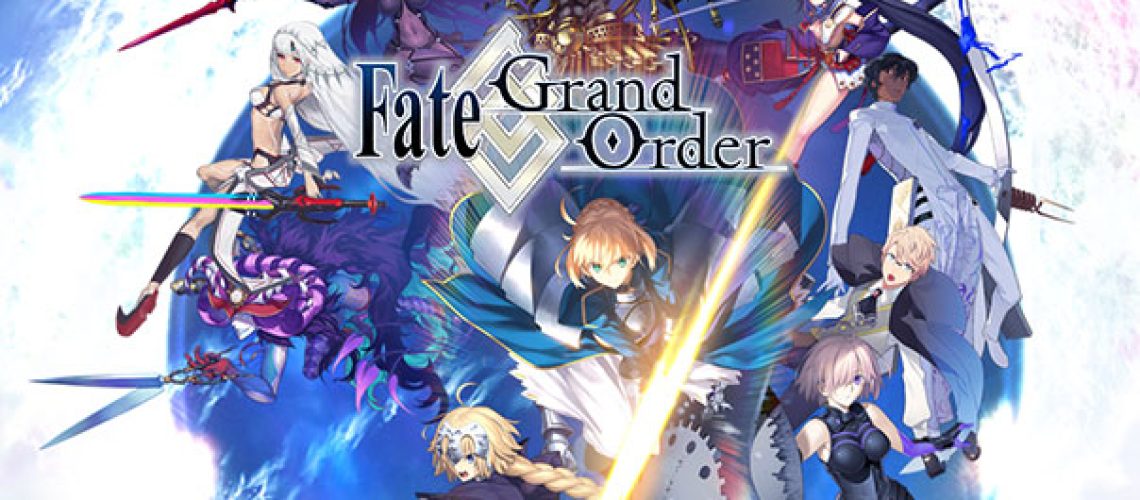I thought hard about what I wanted to write about for the Month of Joy but eventually I knew what it had to be: the game called Fate/Grand Order. It’s a little silly, it’s a little weird, but oh my gosh, especially right now as the first major story arc closes out, it brings me so MUCH joy.
Fate/Grand Order is nominally a mobile game from the Fate franchise. You know, that Japanese thing where King Arthur is a girl and very few of the characters are original? Perhaps when you first heard of it, like me, you rolled your eyes, completely uninterested in yet another bizarre Japanese harem idea. I totally did that!
But one day long ago, I started looking into the setting. In all of the Fate stories from TYPE-MOON, mages battle using familiar-like Servants drawn from folklore, history, and occasionally classical fiction. Each story is set in one of a set of parallel worlds that shares the same basic metaphysics. In F/GO, you play the last mage on earth, and you use lots of Servants while solving Singularities based on pivotal historical milieus. While it’s played on your cellphone, it has more strategic gameplay and a far deeper story than mobile games generally do; I’ve encountered multiple people who have quit the game because it was ‘too much like a desktop game.’ Aww.
And yes, what I found was a setting in which King Arthur (and Mordred) are female. Sanzang from Journey to the West is a girl. Francis Drake is a woman and Emperor Nero is Rome’s sweetheart. This isn’t King Arthur running around in a bikini (well… not normally, anyhow). It’s King Arthur the warrior and knight, Drake the swaggering pirate/explorer, Nero the beloved and mad. They’re not femininely softened, either. They’re plausible interpretations of the historical and mythical figures… but women.
So is the whole cast women? No, not at all. Around 50% of them are male. For example, almost everyone from the Celtic story cycles are just as they were historically presented… which draws stark attention to the women there. Ah, Scáthach, goddess of a pocket dimension and Cú Chulainn’s mentor.
In general, these aren’t shallow characters and they’re not shallow sketches of the figures they portray, either. The creator loves history and he wants to share that love with us. Did you know Nero was beloved as well as insane? I… might have? Maybe? A little? Fiction presents us with plenty of the insane Nero; Fate shows us how lovable she may also have been. Did you know that Marie Antoinette was an extremely kind and loving woman? That Hans Christian Andersen was an unpleasant roommate? How about Julius Caesar as the consummate salesman? King David a surprisingly charming lech? And Florence Nightingale was terrifying (and don’t you try to tell me she wasn’t). This is a story where, during downtime, Vlad III drags you on a quest to destroy the human scum that inspired his hated legend, because when he lived he was a just ruler, not a monster.
All right, now that I’ve described the game, let me tell you how it brings me joy!
First of all, I love Fate and FGO because of how many powerful women were written out of actual history; it seems like justice to write them back in again with new faces. And the women are so well written that even if the gender-balancing started as fan service, it means so much more now.
In every Singularity, a war is fought and heroes sacrifice themselves. I love the emotion, the suffering upon final parting. It feels real given that the setting of the game says such partings are less permanent than you might think. It allows me to appreciate a sad moment without feeling sad myself — and as somebody who avoids downer stories like the plague, this is a precious rarity.
I also love the bizarre, perfect team-ups. There’s a profoundly funny scene in the London Singularity where Shakespeare and Hans Christian Andersen contemplate a world without books. Robin Hood and Billy the Kid defending a small town in the America Singularity just makes sense. Anne Bonny and Mary Read dealing with Blackbeard: intensely satisfying.
In general, I love the humor. It’s intelligent, self-aware and well-timed. I find much of the writing great: not just how the words are put together, but what they have to say. And the characters are smart; so often they say just what I’m thinking a beat after it occurs to me. The pacing of the early stories isn’t great, but the humor and compelling character interactions stay true throughout.
Finally, I love the metaphysics, and the way magic and sorcery are treated like hard sciences by those that study them.
And that’s my joy! If you’re interested in the setting but don’t want to pick up a mobile game, I recommend seeking out the anime ‘Fate/stay night: Unlimited Blade Works’ as more passive and finite introduction to the world. It’s also pretty great stuff.
Chrysoula Tzavelas is a word witch specializing in SF novels and video game content, as well as an amateur digital artist. She has a long-running interest in interactive storytelling, mythology and complex imaginary worlds. When she’s not writing or wrangling two children, she can be found thinking out loud on Twitter. Her latest book, Fury Convergence, is the sixth volume of the cybermagic urban fantasy Senyaza Series, while her epic fantasy novel Citadel of the Sky was recently Book of the Month at the F-BOM SF&F Feminist Book Club.







